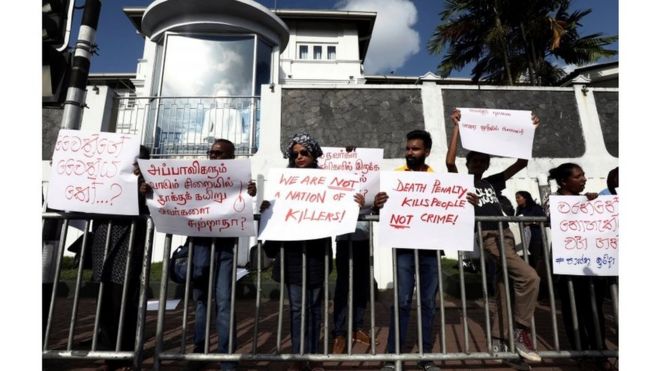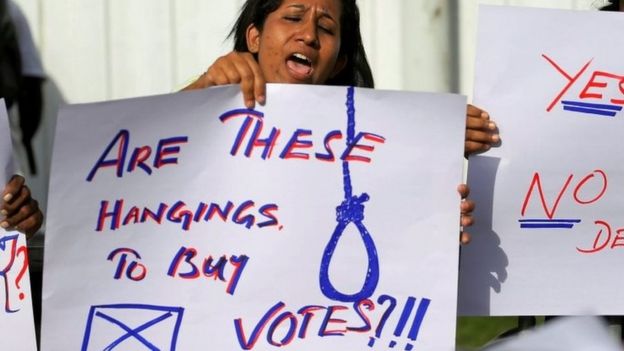President Maithri promises an ‘honourable’ decision
 BY GAGANI WEERAKOON -Jun 23 2019
BY GAGANI WEERAKOON -Jun 23 2019In a sudden turn of events UNP Chairman Kabir Hashim and Kandy District MP Abdul Haleem were sworn into their previously held ministerial portfolios by President Maithripala Sirisena last Wednesday (19) that led to a clear division within the group of Muslim Ministers who collectively submitted their resignation in solidarity with Minister Rishad Bathiudeen a few weeks ago.
UNP Chairman Hashim following resuming his duties at the Ministry said he had decided to accept his previous portfolio after giving deep consideration to appeals made by the Most Venerable Mahanayake Theras, other religious representatives, his district voters, the Muslim community, the Prime Minister, the President and Minister Sajith Premadasa.
Hashim issuing a statement to explain the reasons behind his decision to step down and re-accept the ministry portfolio said even though no allegations had been made against him, personally, the decision to step down was necessary to prevent communal violence engulfing the country.
“As those who have worked with us can attest, we have always been ready and willing to make sacrifices and stand for accountability on behalf of the United National Party. Since our resignation, the Government has made many strides towards addressing the threats faced by the Muslim community, although much more remains to be done. During this period, Sri Lanka’s Muslims had no representation in the Government,” he added.
While noting that now was not the time for political leaders of any community to remain on the sidelines Minister Hashim said: “We urge all elected representatives of our party to let their every decision be guided by the voices of their voters above all others. It is their needs that must inform our every move over the next critical six months. Our supporters are the lifeblood of our party. It is our job over the next several months to turn things around for the UNP and the country and to chart a new course for the Government and the United National Party”.
Prime Minister Ranil Wickremesinghe has been a tower of strength in giving confidence to the people by working towards bringing back the country to normalcy. He has also been instrumental in resolving various genuine issues and grievances the Muslim community has faced, he noted.
“From the day we stepped down, voters and district leaders in our electorates have been appealing to us to represent them in the Government. Last weekend, our party’s Deputy Leader Sajith Premadasa made a personal appeal for the Muslim community to have faith in the Government and stand with them to serve the country and all its religious and ethnic groups. I am, especially, grateful for the statesmanship and political courage that Premadasa has demonstrated by taking such a stand in the face of stiff political opposition.”
The President has invited Hashim to participate at the National Security Council and has decided to hold weekly meetings with Muslim political leaders in his capacity as President and Minister of Defence, Public Security, Law and Order, to assure that Muslims receive equal protection under the law.
However, PM Wickremesinghe was up in arms over the re-appointment of Kabir Hashim and Abdul Haleem as Ministers claiming he was kept in the dark regarding the re-appointments. The nine Muslim Ministers who resigned with the two are also vexed over the issue saying that they had reached a consensus that all of them will return to the fold and that Rishad Bathiudeen should also be re-appointed.
The 18 Muslim Parliamentarians convened a meeting with MP A.H.M. Fowzie and Rauf Hakeem on 18 June to discuss the issue of all former Muslim Ministers getting back to their Ministerial posts. During this meeting, a proposal had been mooted that they should all re-take the posts while a counter proposal was made that if they were to regain their Ministerial portfolios then it should apply to former Minister Rishad Bathiudeen as well. The meeting then ended without a final decision. A powerful Minister was also present to further discuss the issue. At this meeting, a decision had been reached that because all had resigned together, then they should re-join together as well.
Despite such a decision, former Ministers Hashim and Haleem being sworn into their previous posts by the President had angered the other former Muslim Ministers.
The Premier had stated that no Members to the Cabinet can be sworn in without the Prime Minister’s consent and had further alleged that appointments had been effected without his blessings.
Wickremesinghe noted that all former Muslim Ministers had resigned after having briefed him, and only two former Ministers being re-appointed to the Cabinet while keeping him in the dark cannot be condoned.
The Premier had made these remarks during the UNP Working Committee meeting held at the Party Headquarters, Sirikotha.
Leader of the House and Minister Lakshman Kiriella had also criticised the decision taken by the President to re-appoint Hashim and Haleem to the Cabinet without having briefed the Premier beforehand.
Meanwhile, a group of UNP Working Committee members led by Deputy Leader Sajith Premadasa have vehemently protested against Leader Wickremesinghe’s attempt to appoint a group of SLFP members, who pledged support to the PM-led Government against President Sirisena’s decision to appoint Mahinda Rajapaksa as the Prime Mnister last October, and Minister Patali Champika Ranawaka as an electoral organiser.
The decision to appoint Ranawaka as the organiser of Maharagama electorate came under a scathing attack by the Sajith’s camp who protested giving such post to a non-party member.
“If he desires to be appointed as the electoral organiser he might as well join the party and take UNP membership. It is certainly not advisable for an outsider to be appointed as our party’s electoral organiser,” they pointed out.
Presidential polls
Meanwhile, with Presidential Elections in the offing within next six months all parties have renewed their efforts in selecting a proper candidate to the post of first citizen of the country.
It is quite evident that UNP backbenchers with the blessings of some senior ministers have once again launched a campaign to promote Minister Sajith Premadasa as party’s Presidential Candidate.
However, PM Wickremesinghe has remained silent when he was asked as to who should be party’s candidate when the Working Committee met at Sirikotha.
On the other hand the Joint Opposition led by Opposition Leader Mahinda Rajapaksa by the end of last week was able to set their differences aside and agree to support their leader’s final decision on the Presidential Candidate.
Meanwhile, several party leaders who earlier had differences with Baisl Rajapaksa has also appeared to have patched up with the latter and agreed that whatever the election that may come they will lead the campaign managed by Basil Rajapaksa.
These decisions were reached on the backdrop of President Sirisena promising that an honourable decision which will not cause injustice or embarrassment to the party or its supporters would be taken by the Sri Lanka Freedom Party (SLFP) at the next Presidential Election.
He said this at a meeting with women Local Government politicians representing the SLFP Women’s Front at the party headquarters.
The President said the future activities of the party will be streamlined using a strong political programme that would benefit all SLFPers.
The Opposition Group meeting that was convened heated up with Gampaha District Parliamentarian Prasanna Ranatunga pointing out that SLFP General Secretary Dayasiri Jayasekara making derogatory remarks would have grave repercussions.
“We don’t know what his agenda is. But what is the point of attacking the Rajapaksas, SLPP or JO while holding discussions to form an alliance. What is this double standard? Of course, if we start responding and retaliating for all his remarks Dayasiri will have no place to hide,” he said.
UPFA General Secretary Mahinda Amaraweera pointed out that both parties engage in verbal attacks that hurt one another.
Opposition Leader Mahinda Rajapaksa intervening said that all must bear in mind what the priorities are and be mindful before opening their mouths.
“Especially, those who hold responsible posts in the party should think twice or thrice before saying things,” he pointed out.
Both Jayasekara and MP Duminda Dissanayake have been continuously critical about Rajapaksas.
The Rajapaksas have ruled the country more than enough and therefore the electorate must choose a leader not related to the Rajapaksa family for the upcoming Presidential poll and at the Parliamentary election that would follow, National Organiser of the SLFP, former Minister Duminda Dissanayake said.
He added that the time is ripe for other leaders and aspiring and energetic youth of the SLFP and the SLPP to come forward to replace the Rajapaksas.
“There is no doubt that the Rajapaksas have done much for the country that culminated with playing a major role to end the separatist war. But that does not mean they have an inherent right to dominate the political power in this country forever. Now is the right time to make a change to this subservient attitude among voters,” Dissanayake stressed.
Dissanayake, commenting on remarks made by SLFP General Secretary Jayasekara that all Rajapaksas will be in the Cabinet if they came to power at the upcoming polls, said it was true that when Jayasekara became Chief Minister of the Northwestern Province in October 2013, Mahinda, Basil, Chamal, Namal, Nirupama and Shashindra were in power and Gotabaya was the all powerful Defence Secretary.
“Does the SLPP have a second tier leadership? What will happen to the party if and when the domination of Rajapaksas comes to an end?” Dissanayake asked. “But all of them were rejected at the Presidential Election in January 2015. Therefore, bringing them back to power is not the answer,” Dissanayake stressed.
Responding to a question asked by a journalist at a UPFA news briefing at the SLFP office as to whether Gotabaya Rajapaksa would be the party’s Presidential candidate, Dissanayake retorted that the prospect of him contesting is a distant dream.
“I don’t think the US State Department will let him renounce his US citizenship. If the US Government has no issue with it he would have been given that opportunity by now. If he is now officially a Sri Lankan citizen and has renounced his US citizenship as they claim, all he has to do is to show the letter that permitted him to renounce his US citizenship to the public. It is as simple as that. But he is still to do it. Besides, why do you keep asking this question all the time? It is not good for him because he is recuperating after heart surgery,” he said.
Dissanayaka pointed out that incumbent President and SLFP Leader Maithripala Sirisena was the choice of all SLFPers as the party’s Presidential Candidate and he did not see why this stance has to be changed. But it is hoped that he would also get the backing of the SLPP, so that he would then be the candidate of an SLPP – SLFP alliance, assuring him of victory.








